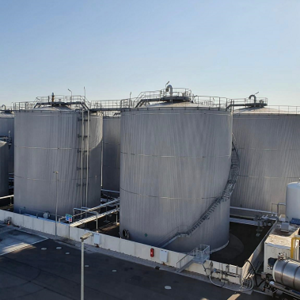Neste further expands feed supply chain via terminal acquisition

Photo: Neste Corp.
May 7, 2020
BY Ron Kotrba
Renewable diesel producer Neste Corp. furthered expansion of its raw material supply chain through acquisition of the Dutch Count Companies BV’s Count Terminal Rotterdam BV and its supporting entities, part of the First Dutch Group of Peter Goedvolk. The transaction, signed and closed May 7, is another important step for the company in execution of its growth strategy, said Peter Vanacker, Neste president and CEO.
“This acquisition supports our efforts to build a global renewable waste and residue raw material platform that can keep pace with the world’s growing demand for renewable products,” Vanacker said. “Count Terminal Rotterdam and Neste Demeter have had a successful long-term collaboration at the site and the acquisition by Neste serves as a logical next step in deepening cooperation and in developing operations further.”
Count Terminal Rotterdam stores, refines and blends renewable waste and residue-based raw materials in the Rotterdam harbor area. This is the first terminal asset Neste owns for renewable feedstock aggregation, enabling the company to further develop its raw material logistics. The company says the transaction will also enhance its competitiveness in the global renewable waste and residue raw material market.
Advertisement
Advertisement
Neste has been active in the Netherlands since 2011 when the Rotterdam renewable diesel refinery started operations. The company says its Rotterdam and Singapore biorefineries are the world’s biggest renewable diesel manufacturing facilities.
The company’s Sluiskil plant in the Netherlands is responsible for storage and pretreatment of renewable raw materials, and Neste Demeter delivers raw materials to renewable diesel plant in Rotterdam. Last year the company opened an office in Hoofddorp, in greater Amsterdam, which serves as a global hub for its growing renewable aviation fuel business.
Just days ago Neste announced completion of its acquisition of Mahoney Environmental, a U.S.-based grease collection and recycling company.
Advertisement
Advertisement
Related Stories
U.S. fuel ethanol capacity fell slightly in April, while biodiesel and renewable diesel capacity held steady, according to data released by the U.S. EIA on June 30. Feedstock consumption was down when compared to the previous month.
XCF Global Inc. on July 8 provided a production update on its flagship New Rise Reno facility, underscoring that the plant has successfully produced SAF, renewable diesel, and renewable naphtha during its initial ramp-up.
The U.S. EPA on July 8 hosted virtual public hearing to gather input on the agency’s recently released proposed rule to set 2026 and 2027 RFS RVOs. Members of the biofuel industry were among those to offer testimony during the event.
The USDA’s Risk Management Agency is implementing multiple changes to the Camelina pilot insurance program for the 2026 and succeeding crop years. The changes will expand coverage options and provide greater flexibility for producers.
EcoCeres Inc. has signed a multi-year agreement to supply British Airways with sustainable aviation fuel (SAF). The fuel will be produced from 100% waste-based biomass feedstock, such as used cooking oil (UCO).
Upcoming Events










